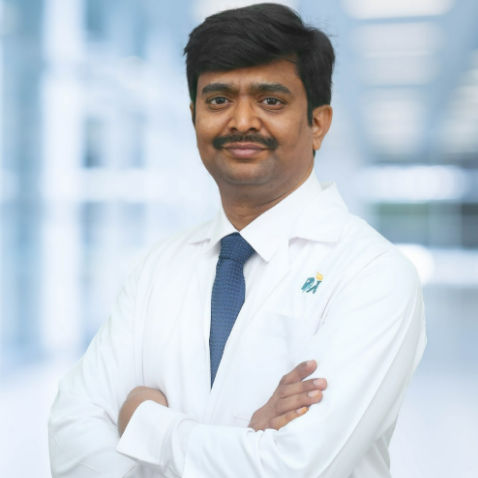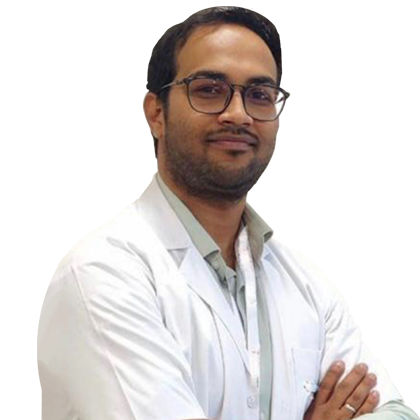Stomach Ulcer Healing Issues
Know all about stomach ulcer healing issues, causes, treatment, and prevention tips to achieve quick recovery without complications.

Written by Dr Sonia Bhatt
Last updated on 3rd Jul, 2025
Stomach ulcers, also known as gastric ulcers, are inflammation caused by high levels of stomach acids or bacterial infections. These ulcers can often cause pain in the abdomen, nausea, vomiting, belching, and bloating. It is important to comprehend the causes and effects of the disease, as well as the available remedies, to be able to properly handle it. This write-up outlines all about stomach ulcers, the healing process, key factors that stimulate or hamper them, and the measures required for correct treatment.
Common Causes of Stomach Ulcers
Stomach ulcers are brought about by factors that disrupt the stomach lining. Below are the key causes:
- Helicobacter Pylori Infection: The common cause of stomach ulcers is the bacterium known as Helicobacter Pylori, which initially erodes the mucus lining of the stomach and exposes the stomach to acid.
- Excessive Use of Non-Steroidal Anti-Inflammatory Drugs (NSAIDs): The use of aspirin, ibuprofen, and naproxen can weaken the stomach lining and thus create ulcers.
- Stress-Induced Gastric Acid Overproduction: While stress may not be the direct cause of ulcers, it can lead to the increased hormones that make the stomach produce acids, thus aggravating ulcers or even causing more.
- Smoking and Alcohol Consumption: Smoking and excessive alcohol consumption may induce inflammation or erosion of the stomach lining, delay healing, and foster ulceration.
- Genetic Predisposition: A family history of ulcers may predispose a person to ulcers because genes control stomach acidity and the body’s ability to prevent ulcer formation.
How do Stomach Ulcers heal?
Stomach ulcers are treated by getting to the root of the problem in addition to promoting the repair of the gastric mucosa lining. Key aspects include:
- Medical Treatment and Medication: Stomach acid is treated with either proton pump inhibitors or H2-receptor antagonists to give protection to the ulcer site. Antibiotics may also be used to eliminate infection caused by H. pylori.
- Dietary Adjustments: Most patients are advised to take foods that are low in acidic content and easy to digest, which is important to prevent the irritation of their ulcers.
- Lifestyle Changes: Staying away from cigarettes, alcohol, and stressful situations assists the lining of the stomach to heal while not being further irritated.
- Regular Monitoring and Follow-Up: This controls the healing time of the ulcer and allows the identification of any recurring symptoms quickly.
Factors Preventing Proper Healing
Several factors may slow down the process of healing stomach ulcers, which may result in complications. Key obstacles include:
- Continued Use of NSAIDs: Long-term consumption of non-steroidal anti-inflammatory drugs thins the stomach lining and aggravates the ulcer.
- Persistent H. pylori Infection: The ulcers do not heal when Helicobacter pylori is not eradicated by antibiotics.
- Unhealthy Diet and Lifestyle: Eating spicy or acidic foods delays the healing process of the stomach lining, and smoking or drinking too much alcohol also makes the stomach lining sore and delays proper healing.
- High Stress Levels: Stress elevates the levels of stomach acid, which hinders the healing process.
- Underlying Health Conditions: Diseases such as diabetes mellitus or mainly immunological abnormalities can impair the repairing mechanisms of damaged tissue.
Symptoms of Unhealed Stomach Ulcers
Healing of ulcers may take some time, and if left untreated, they bring more symptoms that may worsen. Key signs include:
- Persistent Abdominal Pain: When the pain persists even after food intake or at night, this may indicate that the ulcer has not healed.
- Nausea and Vomiting: Untreated ulcers may cause nausea and vomiting together with food refusals.
- Bloating and Fullness: A feeling of discomfort or fullness in the stomach, painful distension, constipation, or diarrhoea are signs of an ulcer that has not responded to treatment.
- Dark Stools or Vomit: The symptoms of a haemorrhaging ulcer include passing black, tarry stools or vomiting with a coffee-ground appearance. These are the signals of a more serious condition.
- Loss of Appetite: Abnormal loss of appetite due to pain is one of the signs of an ulcer that has not been cured.
Consult Top Gastroenterologist
Diagnosis of Healing Issues
Doctors employ different procedures to investigate why a stomach ulcer is not healing. The primary diagnostic techniques are:
- Endoscopy: A process of passing a flexible tube with a camera onto the stomach to check the recovery of the ulcer.
- Blood Tests: Blood tests will determine whether one has H. pylori or anaemia due to ulcer bleeding.
- Imaging Tests: X-rays or barium swallow tests can confirm the presence of ulcers and the intensity of the ailment.
Treatment Options for Healing Issues
Addressing stomach ulcer healing issues involves taking medication and modifying one’s lifestyle and diet goals for proper treatment. The following treatments are commonly recommended:
- Proton Pump Inhibitors: PPIs work by blocking the production of stomach acid and allowing the ulcer to heal. Since a weakened stomach lining cannot tolerate excessive stomach acid, it leads to the ulcer.
- Antibiotics for H. pylori: In cases where H. pylori infection is identified, the patients are treated with antibiotics to get rid of the bacteria and speed up the recovery.
- Antacids and Protective Medications: Antacids and sucralfate contain substances that coat the ulcer and prevent stomach acid from attacking the ulcer.
- Lifestyle and Dietary Changes: Avoiding spicy and oily foods, excessive stress and other irritants such as alcohol and cigarettes can stimulate the healing process and prevent the recurrence of ulcers.
- Surgical Intervention: Few stomach ulcer complications necessitate surgery, especially those that have not responded to medication and pose a threat to patients' lives.
Diet and Nutrition in Recovery
Eating habits are major determinants of the healing process of stomach ulcers because some foods promote healing while others make it worse. Here are important dietary considerations:
1. Foods that Promote Healing
- Lean proteins like chicken, turkey, tofu, etc.
- Fruits that are not a source of acids, for example, bananas, apples, and melons
- Vegetables such as spinach, carrots, and sweet potatoes
- Whole grains such as oatmeal, brown rice, quinoa, etc.
- Probiotic-rich foods such as yoghurt and kefir for gut health
2. Foods to Avoid
- Spicy foods
- Fatty or fried meals
- Caffeine and alcohol
- Oranges, lemons, tomatoes, and vinegar
- Carbonated drinks
- Highly processed foods
Potential Complications of Unhealed Ulcers
Stomach ulcers, if untreated, can lead to serious complications. The following risks are associated with unhealed ulcers:
- Internal Bleeding: Untreated ulcers also lead to the breakdown of the blood vessels. As a result, they lead to internal bleeding, which is characterised by black stool or vomiting with stained marks like coffee.
- Perforation of the Stomach Lining: In extreme conditions, if an ulcer is left untreated, it leads to peritonitis, a deadly infection.
- Gastric Outlet Obstruction: Due to chronic ulcers, scar tissue forms around the pylorus, obstructing the stomach and causing nausea, vomiting, and weight loss.
- Increased Risk of Stomach Cancer: Chronic ulcers, particularly those resulting from H. pylori, are known to have a risk of leading to stomach cancer after some time.
Preventive Measures
Preventive measures will lower the chances of developing stomach ulcers. Key measures include:
- Avoidance of Triggers: Avoid foods that can cause irritation, such as spices, alcohol, and non-steroidal anti-inflammatory drugs.
- Regular Medical Check-ups: Periodic medical check-ups assist in identifying ulcers in advance. Hence, with early intervention and treatment, their effects can be managed.
Conclusion
Stomach ulcers are sometimes tricky to cure due to factors including diet, infections, and lifestyles, among others. Any delays may result in an unfavourable outcome like internal bleeding, infection and stomach cancer. So, knowing the symptoms, preventive measures, and lifestyle and dietary changes helps people identify and control this condition in its early stages. Also, assistance from proper medical treatment helps individuals to get better and lead a life free from digestive worries.
Consult Top Gastroenterologist
Consult Top Gastroenterologist

Dr Harish K C
Gastroenterology/gi Medicine Specialist
15 Years • MBBS MD DM MRCP(UK) (SCE-Gastroenterology and Hepatology)
Bangalore
Manipal Hospital, Bangalore

Dr Bhargav Vuppumalla
General Physician/ Internal Medicine Specialist
5 Years • MBBS MD GENERAL MEDICINE
Bengaluru
Apollo Medical Center, Marathahalli, Bengaluru

Dr Supreet Kumar
Surgical Gastroenterologist
11 Years • MBBS ( Gold Medalist and Distinction Holder ) MS General Surgery ( Honors) DrNB Surgical Gastroenterology Fellowship Liver Transplant and HPB Surgery ( IAH ) FMAS MMAS HPB ( Masters in Minimal Access Surgery)
Delhi
Apollo Hospitals Indraprastha, Delhi
(400+ Patients)

Dr. Paramesh K N
Gastroenterology/gi Medicine Specialist
16 Years • MBBS, MS ( General Surgery), DNB ( Surgical Gastroenterology)
Hyderabad
Sprint Diagnostics Centre, Hyderabad

Dr. Mohd Irtaza
Gastroenterology/gi Medicine Specialist
11 Years • MBBS, MD Internal Medicine, DM Gastroenterology
Delhi
Apollo Hospitals Indraprastha, Delhi
(100+ Patients)
Consult Top Gastroenterologist

Dr Harish K C
Gastroenterology/gi Medicine Specialist
15 Years • MBBS MD DM MRCP(UK) (SCE-Gastroenterology and Hepatology)
Bangalore
Manipal Hospital, Bangalore

Dr Bhargav Vuppumalla
General Physician/ Internal Medicine Specialist
5 Years • MBBS MD GENERAL MEDICINE
Bengaluru
Apollo Medical Center, Marathahalli, Bengaluru

Dr Supreet Kumar
Surgical Gastroenterologist
11 Years • MBBS ( Gold Medalist and Distinction Holder ) MS General Surgery ( Honors) DrNB Surgical Gastroenterology Fellowship Liver Transplant and HPB Surgery ( IAH ) FMAS MMAS HPB ( Masters in Minimal Access Surgery)
Delhi
Apollo Hospitals Indraprastha, Delhi
(400+ Patients)

Dr. Paramesh K N
Gastroenterology/gi Medicine Specialist
16 Years • MBBS, MS ( General Surgery), DNB ( Surgical Gastroenterology)
Hyderabad
Sprint Diagnostics Centre, Hyderabad

Dr. Mohd Irtaza
Gastroenterology/gi Medicine Specialist
11 Years • MBBS, MD Internal Medicine, DM Gastroenterology
Delhi
Apollo Hospitals Indraprastha, Delhi
(100+ Patients)